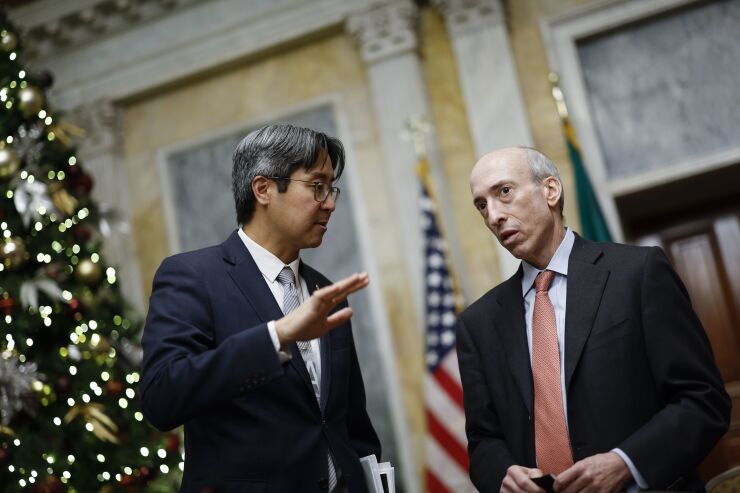WASHINGTON — Acting Comptroller of the Currency Michael Hsu said that crypto companies need a single consolidated supervisor — either at home or abroad — saying regulatory gaps create the conditions for excessive risk.
Bank regulators like Hsu have consistently pointed to their own limits in regulating the crypto market, particularly after the unraveling of crypto exchange FTX and subsequent turmoil in the industry. The Office of the Comptroller of the Currency, the Federal Reserve and the Federal Deposit Insurance Corp. can take some moves to
In a speech at the Institute of International Bankers conference in Washington D.C., Hsu reiterated the need for a global supervisory framework for crypto, and warned of the dangers that could arise in its absence.
"Until that is done, crypto firms with subsidiaries and operations in multiple jurisdictions will be able to arbitrage local regulations and potentially play shell games using inter-affiliate transactions to obfuscate and mask their true risk profiles," he said. "To be clear, not all global crypto players will do this. But we won't be able to know which players are trustworthy and which aren't until a credible third party, like a consolidated home country supervisor, can meaningfully oversee them."
"Currently, no crypto platforms are subject to consolidated supervision," he added. "Not one."
To make this point, Hsu compared the collapse of FTX to the
"Both faced fragmented supervision by a combination of state, federal, and foreign authorities," Hsu said. "Both lacked a lead or 'home' regulator with authority and responsibility for developing a consolidated and holistic view of the firms. Both operated across jurisdictions where there was no established framework for regulators to share information on the firms' operations and risk controls. Both used multiple auditors to ensure that no one could have a holistic view of their firms."
And similarly, BCCI and FTX could conceal their fraudulent activity using these strategies, Hsu said.
"By seemingly being everywhere and structuring entities in multiple jurisdictions, they were effectively nowhere and were able to evade meaningful regulation." Hsu said.
Notably, any changes to address similar concerns in the crypto industry will have to happen outside of the banking system, Hsu said. He suggested that international bodies such as the Financial Stability Board, International Monetary Fund, and CPMI/IOSCO use the BCCI situation as a model to suss out problematic actors in crypto.
Action from Congress might be necessary, Hsu suggested. He noted that after the failure of BCCI, Congress passed the Foreign Bank Supervision Enhancement Act, barring any foreign bank from entering into the United States unless it was subject to comprehensive, consolidated supervision by a home country agency.
Hsu also pushed back on some arguments made by crypto advocates, and said that crypto is overwhelmingly used as an asset class rather than what some early proponents hoped would be a replacement for the traditional banking system. And crypto, like most asset classes or any attempt to participate in the financial markets, requires intermediaries, which often end up being banks.
"Intermediaries are required for crypto to operate at any scale," Hsu said. "The events of the past year have shown that trust in those intermediaries can be quickly lost, large numbers of individuals can be hurt, and knock-on effects to the traditional financial system can result."







